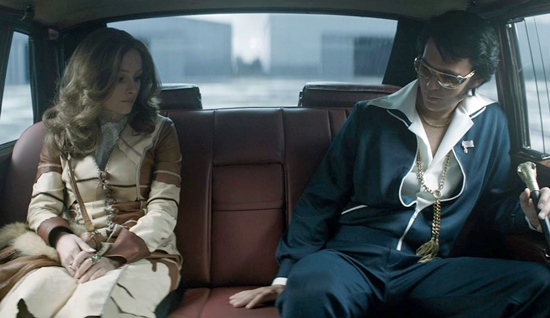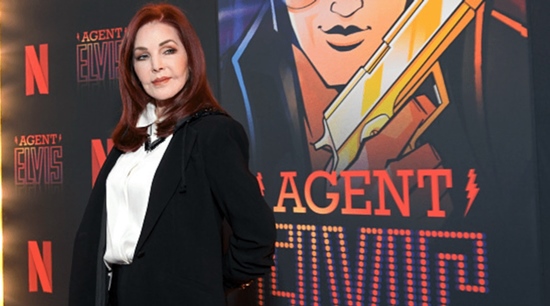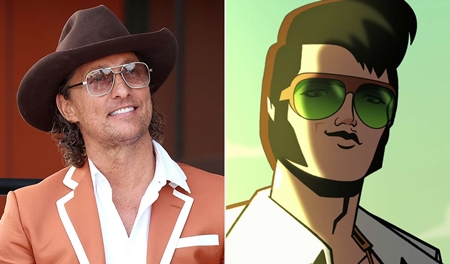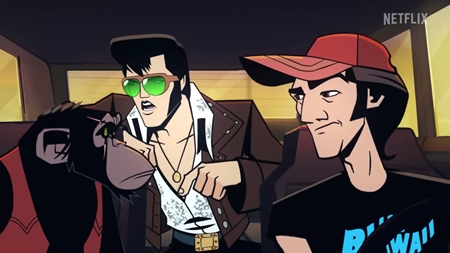In a thought-provoking 3,000 word article, EIN examines the impact of Baz Luhrmann’s film, Elvis, and the adult-orientated animation, Agent Elvis.
Are they good or bad for how society views Elvis and which one will have the greatest impact?
EIN Spotlight by Nigel Patterson
- May 2023
|
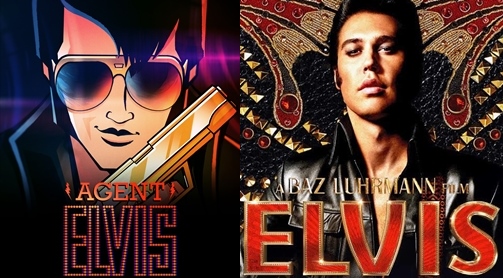 |
The past year has been a glorious period for Elvis fans. Firstly, Baz Luhrmann’s glitzy and over-the-top quasi-biopic, ELVIS, set box office registers “rockin’ and a rollin”, becoming last year’s biggest grossing non-franchise film. More recently, streaming giant, Netflix, has given the world Agent Elvis, a tongue-in-cheek and profanity laden satire (the antithesis of the delightful other Elvis related animation, Li’l Elvis Jones & the Truckstoppers* broadcast “downunder” in 1997-98).
This article explores the potential impact ELVIS and Agent Elvis on the general public’s views about Elvis (with a digression into the tangential issue of “twinless twins”).
ELVIS
Blistering, turbocharged chronicle of the King - (The Guardian)
Baz Luhrmann turns the life of Elvis Aaron Presley into a three-ring circus with more sensation than sense in Elvis. But it's got a good beat and you can dance … - (Rotten Tomatoes)
Ostensibly a biopic, Baz Luhrmann’s exhilarating telling of the Elvis Presley story is dotted with revisionist history.
Early in the film, Marion Keisker’s hysterical reaction to Elvis on the Louisiana Hayride symbolizes the liberties Baz Luhrmann took in producing his gloriously frenetic and in-your-face, celluloid opus about the King of Rock and Roll. That this actually happened would be very out of character for Marion Keisker, but as a narrative device it helps sell the impact Elvis had on the opposite sex (of all ages) in the mid-1950s. (see below **)
Another factual falsity is Elvis’ visit to Beale Street and interacting with B.B. King, Big Mama Thornton, Sister Rosetta Tharpe, and the man who could out move Elvis, Little Richard. While Elvis was friends with B.B. King…… Big Mama Thornton, Sister Rosetta Tharpe, and Little
Richard were not performers Elvis met on Beale Street.
Having said that, the Beale Street visit is a powerful (and key) scene in the film, not so much because of Elvis, but rather because of the wonderful culture and music promoted by the various Black American musicians…… music and culture that helped shape Elvis the person and Elvis the musician.
Other factual errors/inaccuracies in the film include:
● the Colonel did not first meet Elvis at the Louisiana Hayride;
● the Colonel did not confront Elvis in the carnival House of Mirrors;
● Elvis didn’t sing Trouble at his Russwood Park concert in Memphis and while there were riots during Elvis concerts this was not the case at Russwood Park;
● the Colonel and the filming of the ‘68 Comeback Special was greatly exaggerated, including the meeting under the Hollywood sign in Los Angeles (admittedly these scenes were done with great comedic effect);
● If I Can Dream was not written in response to the assassination of Robert Kennedy (its
writing was principally motivated by the murder of Martin Luther King); and
● Elvis didn’t fire the Colonel while performing on stage in Las Vegas (although some fans probably wish he had).
Most importantly, if the viewer is to believe Baz Luhrmann, it was Priscilla Presley who tried to “save” Elvis from his prescription medication addiction in his final years - Priscilla meeting Baz Luhrmann and facilitating access for filming at Graceland at least partially explains this major stretch in the exercise of dramatic licence.
The truth, of course, is that it was Linda Thompson who was with Elvis “day and night” from mid-1972 to late 1976 and valiantly tried to save Elvis, yet Linda is completely missing…… whitewashed from the film!
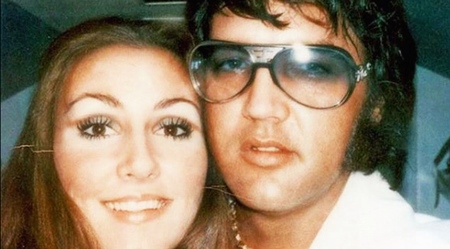 |
 |
Similarly, Ginger Alden, who was Elvis’ partner (and possibly fiancée) for the last eight months of his life, doesn’t feature in Baz Luhrmann’s opus.
Stories suggest that Linda Thompson is understandably angry at her omission from the film (it does beg a serious question).
And EIN suspects the surviving members of Elvis’ Memphis Mafia (Jerry Schilling excepted given his close friendship with Priscilla and input to the film) would be similarly aggrieved at their underwhelming, cursory role, in 'ELVIS'.
EIN note: At various launches of the film and awards ceremonies, Jerry Schilling appeared alongside Priscilla and other family members.
Despite these flaws in the story, Elvis is a dazzling and sensory rollercoaster ride, which entertains and appeals to a broad audience well beyond Elvis’ customary fandom.
And, the number of non-Elvis fans saying they really enjoyed the film is significant, and therein lies the problem…… as they will be thinking, discussing, and conveying, “things Elvis”.
Read EIN’s Spotlight (news, reviews, etc) about Baz Luhrmann’s 'ELVIS'
Agent Elvis.
In some ways it’s surprising that the show Agent Elvis, where Elvis Presley is a secret agent saving the world between Las Vegas concerts with a plucky chimp sidekick, doesn’t already exist. Throughout his career, his image was commodified and it’s easy to picture this show’s concept as a cartoon playing on Saturday mornings between Superman and Josie and the Pussycats to wide-eyed American children. But Netflix’s Agent Elvis is extremely child unfriendly and has more in common with Tarantino’s Once Upon a Time in Hollywood than Hanna-Barbera’s Super Friends. (Leila Latif, The Guardian)
Matthew McConaughey voices Elvis Presley in Supremely Silly Netflix Animated Comedy (The Hollywood Reporter)
If there is one thing that has divided Elvis fans, it is Netflix’s Agent Elvis, a subversively exaggerated, and over-18’s, animation about super-spy, Elvis. Fans either love it or hate it… much like Elvis in the 1950s, there doesn’t seem to be any middle ground (and we know how that turned out).
Sally Hoedel, author of the excellent books, Destined To Die Young and Destined To Fly - The Story of Pilot Ron Strauss: From Iowa to Elvis, wrote a thought-provoking article about Agent Elvis which was published on her Facebook page in March. Sally rightfully states:
The problem is that the real cultural impact of Elvis Presley is not understood or embraced by Americans, as it should be. He’s often reduced to jumpsuits, sideburns and some bad jokes.
However, EIN considers that the context in which Agent Elvis operates is different to the one in which these contrivances act. Agent Elvis is not a mainstream series impacting the general population (“average Americans”).
In her article, Sally Hoedel goes on to say:
The series fully exploits all the typical stereotypes that average Americans already cling too tightly to as their idea of who Elvis was.
Will Agent Elvis reinforce negative stereotypes of Elvis? Again, EIN doubts any such impact will be minimal as the animation will only be watched by some fans and a specific niche audience who are watching it for reasons foreign to those open to assimilating stereotypical messages.
It is interesting that the controversy around Agent Elvis has been so fierce, while the controversy around Luhrmann’s ELVIS has been comparatively muted.
By its very nature, Agent Elvis is anarchic. As an “mature viewers only” series it is targeted at a generally young adult niche market characterized by liking offbeat, dark and satirical humor. In this regard, it performs very well, although it fails to reach the satirical heights of subversive series like South Park and Archer. When creating Agent Elvis, the producers likely did so in the context of the success of these series.
EIN Note: One of Agent Elvis’ executive producers, Mike Arnold, has written six episodes of Archer.
While the narrative exaggerates tropes of action/spy films, it can also be viewed as an over-the-top homage to its principal character and his love of law enforcement. The character of Elvis and dialogue as voiced by Matthew McConaughey, is so tongue-in-cheek, you can almost picture Elvis laughing out loud at the antics and fun chutzpah on display.
The funniest segments in Agent Elvis involve Elvis’ pet chimpanzee, Scatter, portrayed as a psychotic, alcohol, and drug ingesting troglodyte. Scatter symbolizes the ridiculous nature of the animated-comedy and why it should be adjudged as such.
One of Elvis’ favorite comedy groups was Monty Python and the humor in Agent Elvis, while certainly more confronting and crude at times, is surely a natural evolutionary extension of Monty Python humor. And much of the humor in Monty Python poked fun at religion. Elvis was an avowed Christian who had a personal relationship with God, but he could still laugh at religious parodies.
EIN suspects Elvis would have liked the ridiculous, but also (at times), very smart humor of Agent Elvis.
As with other satirical shows the humor in Agent Elvis can be “hit and miss”, and at times there is an apparent dissonance in the storytelling and tenor of the show. For example, in episode 5, after clever satire about Elvis bringing a handgun through White House security, the
narrative morphs into President Nixon spewing forth racist comments and the murder of the First Lady.
Sally Hoedel uses episode 5 to illustrate key points:
In another scene, it is suggested that cocaine is only for winners. In the oval office, there is constant racial slander coming from Nixon turning that very real meeting, which began and ended respectfully for both Nixon and Elvis, into a modern day political platform. At one point, the “character” of Elvis says, “I should have shot that racist bastard.”
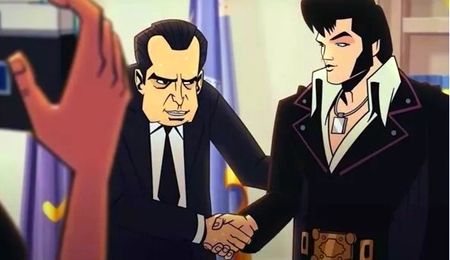 |
EIN has a different view. The cocaine reference is a clever satirical statement about the delusion behind drug taking, while the (intended?) irony of this episode is that, as portrayed, Elvis’ reaction to Nixon’s racism would have been also true had he actually known about it at the time. For as we discovered following the leaking of Nixon recordings, Nixon was both a racist and misogynist.
On the issue of the “real” Elvis-Nixon meeting being turned into a “modern day political platform”, EIN notes that Elvis was a political and socially divisive figure in the 1950s, and since his death he has been a socio-cultural touchstone. It is therefore not surprising that his name, image and legend continue to be used in a political way (albeit in this instance, in a spy spoof). In fact, if they weren’t, we likely wouldn’t be discussing a series called Agent Elvis.
Sally Hoedel also comments:
Agent Elvis does nothing to enhance that continued impact. What it actually does is further dehumanize Elvis Presley. Elvis loved comic books when he was a boy. That was not unusual. It’s safe to say that most boys in the 1940s found great enjoyment in comic books. Yet, for some reason that has come to mean that Elvis, even as a grown man, wanted to be a comic book hero.
EIN is unsure how Agent Elvis further dehumanizes Elvis. For this to occur would require the series being considered as a serious reflection of its central character, and not what it is, a satirical parody. In the context of its comparatively small, niche market, we do not see the issue as being a material one.
Undoubtedly, dehumanisation of Elvis is a real issue, but it is more concerned with the “mainstream” commodification of his name and image, since the mid-1950s. Elvis very quickly became a “product”, one that has been continually, and sometimes ingenuously, exploited.
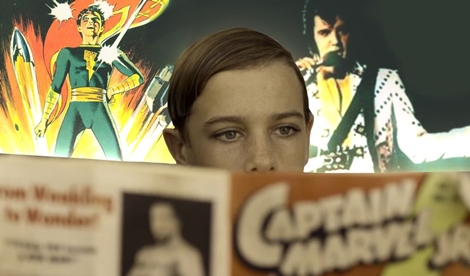 |
The “Elvis-comic book lover-super hero” connection has been a recurring theme in academic discussions about Elvis, and both Agent Elvis and Luhrmann’s ELVIS use it effectively as a narrative device.
The “adult” Elvis incorporated the Captain Marvel Jr. lightning bolt into his TCB jewelry and on the Lisa Marie plane, and his 1970s stage jumpsuits reflected superhero costumes, including the iconic Superman/ Captain Marvel/ Captain Marvel Jr. type capes and wide belts. Is it not a reasonable view to think internally, Elvis harbored related psychological drivers?
The symbolism of Elvis’ jumpsuits through the 1970s is deserving of its own article. However, for the purposes of this discussion, it is important to note how Elvis used his jumpsuit and cape during and at the end of his concerts. His kneeling in front of his audience with the cape fully outstretched behind him was surely signifying that he was someone special…… ..a god or super hero. EIN can think of no other singer who could have done it!
EIN also found these comments by Catherine Martin, costume designer for the ELVIS biopic, on Elvis’ jumpsuits, interesting and relevant:
“We did a deep dive on every jumpsuit he’s ever worn, and we made a decision to chronologically, show the suits out of order,” she said. “So, we went from a very pure white, classic suit to a more colourful suit as his life became crazier. His clothes became crazier to become parallel with his existence."
A salient theme in the realm of superheroes is that of “double identity” (think Clark Kent- Superman). It has been noted how photos of the younger Elvis are similar to images of Captain Marvel Jr…..the most powerful boy in the world. “Double identity” can function in several ways. It also has a connection to being a surviving twin.
| In his often-confronting book, The Inner Elvis: A Psychological Biography of Elvis Aaron Presley, clinical psychologist, Peter Whitmer, discusses how the death of Jesse Garon meant Elvis became what is called a “twinless twin”: |
|
|
‘...every twinless twin displays the same distinctive psychological pattern'. The twinless twin wants to prove his uniqueness, to stand as an individual. Yet he is also powerfully pulled toward being reunited with the dead twin. To win the mother's love, he must grieve for the dead twin. Yet at the same time, to establish self-love and his own security, he must compete with the very person he is compelled to mourn.’
To be unique, to stand as an individual, involves conscious and unconscious effort, and a vision (a dream) of what one wants to be and act. Comic book readers tend to be dreamers and we know from Elvis’ address on being named one of U.S. Jaycees’ Ten Outstanding Young Men of America in 1970, he acknowledged this in himself, saying:
... "When I was a child, ladies and gentlemen, I was a dreamer. I read comic books, and I was the hero of the comic book. I saw movies, and I was the hero in the movie. So every dream I ever dreamed has come true a hundred times."
Researchers and clinicians have long commented on the lack of research into “twinless twins” and the impact of the missing twin on the emotional-psychological growth of the surviving twin and their struggle to find their own way of integrating the loss of their co-twin. In a tertiary seminar paper, Otivia Headley, observed:
…….mental health professionals will benefit by understanding the differential psychological development of children who have lost a twin and in turn lend support to the children as well as offer parents guidelines on how to help not only themselves but also the child that survived and help them cope with that loss.
On this issue, Peter Whitmer, commented:
They must wrestle with their relationship with their twin. In this private world, much of their torment of wondering, “Who am I?” goes on below the level of conscious thought. This inner struggle influences behavior in ways that can be subtle at the onset, yet dominant in the adult personality……… Elvis was trying to come to grips not only with who he was in relation to the world outside him, but also who he was in relation to Jesse: that world inside him.
So where does that leave us with Agent Elvis?
More than a month after its release, and not surprisingly given its niche audience, the series has failed to make any of the Top 10 Netflix television program lists in any of the many countries where the streaming service is available.
We doubt that Agent Elvis is processed by its core audience as anything more than what it is - an obvious “send-up” using Elvis’ life and interest in law enforcement as narrative drivers. EIN does not see Agent Elvis contributing to “mainstream discussion” about Elvis - with the exception of critics’ reviews, its discourse will occur within the relatively narrow worlds of Elvis and dark humor fans.
Based on the discourse on social media, that the humor doesn’t resonate with older fans and those with more conservative views, is hardly surprising.
To quote, the late George Plasketes (author of Images of Elvis Presley in American Culture 1977-1997: The Mystery Terrain, and True Disbelievers: The Elvis Contagion), “On one level, the inconsistent character of southern US culture lives on.” |
|
'ELVIS' or Agent Elvis? - the bottom line
Given the commentary on both ELVIS and Agent Elvis, is one better or worse than the other?
Both productions serve a different purpose and a largely different audience. Pragmatically, given the reach of Baz Luhrmann’s ELVIS, its misrepresentation of certain “important” things in the Elvis story will have a far deeper impact on beliefs around Elvis, than the unsanctified and exaggerated cartoon humor of the obviously “not to be taken seriously”, Agent Elvis.
Luhrmann’s ELVIS has reached a wide mainstream audience, and many who have seen it, now believe Priscilla Presley to be the person who tried to save Elvis, and also have an incorrect perception of Elvis on Beale Street - arguably, these are a much greater travesty than any reputational damage done by the irreverent satire of Agent Elvis.
Comment on this Article - send us YOUR THOUGHTS..
**EIN Comment: The Australian Children’s Television Foundation (ACTF), producers of Li’l Elvis Jones & the Truckstoppers, approached EPE for its approval. EPE wrote back declining approval for what was a positive and uplifting story for children, paying strong homage to Elvis.
The 26-episode series proceeded anyway, supported by a series of books based on episodes of the show, and winning several awards.
EIN finds it interesting that, in 2023, EPE is supportive of a profanity laden animated series based around Elvis. The evolution of corporate perspective?
|
 |
Comment on this Article
Spotlight by Nigel Patterson.
-Copyright EIN April 2023
EIN Website content © Copyright the Elvis Information Network.
** Reviewer’s Post Review Comment: My esteemed colleague, Piers, pointed out that in fact Marion Keisker did scream when she first saw Elvis performing live on stage. Marion is recorded as saying about seeing Elvis on Memphis August 5, 1955, at the Overton Park Shell: "I heard someone screaming - and I am really a very restrained person publicly - but all of a sudden I realised it was me"
This shows that even the most restrained of us can be affected by charisma and entertainment genius. |
EIN Reader Feedback.
Our Spotlight article has generated strong and interesting feedback…..
Karine: Bonjour, J’ai bien apprécié le film "Elvis", car depuis l’avoir vu, je suis devenue complètement addicte de cette personne que je ne connaissais pas, donc, vraiment, il a un impact considérable sur le fait qu’Elvis ne soit pas oublié !
Quant à "Agent Elvis", c’est vraiment un dessin animé pour adulte, grossier, vulgaire, tout va très vite, scènes ensanglantées, je trouve qu’il renvoie une mauvaise image d’Elvis, de son univers, dommage, il aurait pu être beaucoup plus attrayant...Bien cordialement….
English translation: Hello, I really enjoyed the movie "Elvis", because since seeing it, I became completely addicted to this person I didn't know, so, really, it has a considerable impact on the fact that Elvis does not be not forgotten!
As for "Agent Elvis", it's really a cartoon for adults, rude, vulgar, everything goes very quickly, bloody scenes, I find that it sends back a bad image of Elvis, of his universe, too bad, he would have could have been much more attractive...Best regards….
Jim: Agent Elvis is a hoot. I think those who don’t like it should loosen up and take it for what it is a send up.
Larry: Baz' ELVIS is magical. Netflix' Agent Elvis is trash. Elvis wasn't a documentary so the perceived "inaccuracies" in the story line didn't bother me. Baz, Austin and Tom captured Elvis' soul like I never thought possible. Since the movie came out, Elvis has a million more YouTube subscribers so it enhanced his legacy.
On the other hand, the previews for Agent Elvis turned me off and I won't watch it. It appeals to the lowest common denominator and I wish Priscilla had let well enough alone. The potty-mouth language coming out of Matthew McConaughey alone is too much to bear. Y'all do great work! Thank you!
Judy: I liked your story. I’ve seen the movie three times and think Austin Butler is wonderful. I don’t have Netflix to watch the cartoon show. I’ve heard others say it is bad.
Jerry R: Thanks for your article which I found interesting. I saw the Baz Luhrman film and liked it. It was very flashy and I agree with you that he has taken liberties with facts. I watched the first episode of the Agent Elvis show it was offbeat. Some of the jokes were funny, I’m not a prude but the foul language surprised me.
Barry S: I think the new film ELVIS was very clever in presenting a rather condensed look at Elvis' life story that would suit the new millennials watching.
Older fans would know that Elvis didn’t sing Trouble at his Memphis concert but the scene beautifully captured the raw excitement of Elvis at the time.
Those old 1950s TV clips sure look dated now and no longer shocking but in his film Baz Luhrmann managed to create something so exciting that even in 2022 you could feel the outrageousness coming through.
It is a shame that the film wasn't longer and so include Linda Thompson but I feel sure that in one interview I heard Luhrmann said there was a longer version with her in it.
It was in early 1976 that a team tried to get Elvis into the Scripps clinic so as to detox. Thompson may have been involved but I am sure that the lawyers would have contacted Priscilla about it so she was involved even if she wasn't the prime motivator
Although while I do agree that the film is terribly "pro" Priscilla, again I personally think it doesn't matter much as it is ELVIS' story.
So I don't see any "revisionist history" in the movie's story line.
As for Agent Elvis!
Elvis would have loved to be a Secret Agent - what a shame he didn't record the 60s hit "Secret Agent Man" what a great song that would have been for him.
Elvis had a great sense of humor and he would have laughed like crazy at the new series.
Again Priscilla is majorly involved but this time the story-line is TRULY OUT THERE.
While I wouldn't give it the high rating of other reviews I do think it is funny and I don't see any damage will be done to Elvis' legacy by something so ridiculous.
Elvis covered all bases and if his brand new cartoon series is on Netflix and his new movie is one of THE WORLD's biggest earners of last year surely that is a real positive.
Both the ELVIS film and Agent Elvis have got younger people asking me about Elvis whereas before they probably were not interested in something so old and not of this new modern TikToK era.
That has to be good.
Paul C: I too like the ELVIS movie but hate telling people that he didn’t die straight
after Priscilla P left him and the other points you raise in your
piece.
I understood the Agent Elvis points you raised but I struggled after episode 3 and certainly ended my viewing after the Vietnam joke about a ‘wank sock’.
I’m 53 but it didn’t get me hooked and I’d rather not spend my time on it.
I totally dislike it and cannot bare to watch it.
For me, it’s a vanity project yet again for PP to make sure she is in the history books.
Keep up the great work EIN! I enjoy it.
Bryan G: Just read your interesting commentary on Agent Elvis and the ELVIS movie. I’d like to add my comments about the Elvis movie. I have not seen the movie as I don’t like to watch Elvis biographies and I don’t like watching Elvis movies that tow the typical line: great in to 50s, army, sold out in the 60s, Vegas lounge lizard in the 70s, dead. However, I have seen clips and, more importantly, I have heard comments from numerous people, including quite a few who are not Elvis fans, and the comments were 100% positive. Most commented that it was very sympathetic towards Elvis and several people told me they got a new understanding of Elvis the person. For me, this is the best possible outcome for a movie like this. While the movie may be stylized and certainly take liberties, for once we have an Elvis biography that doesn’t show Elvis as some washed up loser in the 70s or, more specifically, if the portrayal seems such the movie makes it clear that Elvis was a prisoner of his fame and that he wasn’t solely responsible for his story.
What excited me the most about discussions I had with people about the movie was how many of them really came away with a sense of appreciation for Elvis the artist, as well as a clear understanding of how the Colonel’s narrow vision for Elvis contributed to his decline and also to Elvis’ lack of standing as an artist. These two items alone make me love the film, despite having no desire to see it. From the clips I’ve seen, particularly the movie’s ending, Elvis is treated very well, and personally I think it’s stunning that Baz Luhrmann decided to end the movie with Elvis singing Unchained Melody and use the real Elvis in it – that’s way more than the Estate has ever done to redeem Elvis’ later 70s career.
So ironically, I loved a movie I’ve never seen because of the positive influence it had on its audiences, and not just on Elvis fans. That’s what Elvis needs – more younger people and casual fans getting interested in the man and the art behind the image.
This leads me to what I didn’t like, and what is now the reason why I
wouldn’t see the movie. While from what I know I actually would be
interested in seeing Elvis, I don’t want to now because of the lack of
publicity and capitalization on RCA’s part. Her we have perhaps the
biggest potential for marketing Elvis and selling records in the past
20+ years (at least since the release of Elvis #1’s in 2022) and what
does RCA do? Practically nothing. Yes, they release a companion album of
sorts in the combine Elvis #1’s/ 2nd to None release but that was
A) extremely lazy,
B) not publicized except for a token amount and
C) not a good way to get some more sales for Elvis. Yes, the release did sell very well, going back into the top 40 here in the US but it’s technically not a NEW release so it doesn’t really hit anyone’s radar.
I was hoping for a companion release like the Diamonds album that accompanied the Elton John movie, or the various Queen releases alongside Bohemian Rhapsody, but of course there was nothing.
As a result, we have a very successful movie that got non-fans and younger people interested in Elvis and we have no product and no publicity (other than Warner Bros’ own) to market to them and to keep Elvis in the public eye. Heck, the movie was even up for multiple Oscars and Austin Butler was praised across the board. In my view it was a gift to RCA and yet we got nothing. While this is really what I expected, it still leaves a bitter taste in my mouth. This movie was a once in a generation thing and for once had a positive spin on Elvis and it is yet another in a long list of missed opportunities that RCA failed to capitalize on. This one is even more egregious as the hard work was done for them by Baz Luhrmann and Warner Bros.!
So, in short, my two cents – Elvis the movie is probably the best movie about Elvis we’ll ever get. Elvis fans don’t need a detailed play-by-play of Elvis’ life - we know the story. Non-fans don’t care that much, and they definitely don't need some depressing film focusing on Elvis' decline - they probably already know all the stereotypes surrounding that story, so a stylized musical fantasy that showcases Elvis as superhero was just the right fit in my view. I’m very happy it came along but still sad for Elvis as the lack of care about his legacy on the part of its managers is very apparent. It’s truly ironic that someone like Baz Luhrmann, who doesn’t need to enhance Elvis’ legacy to enhance his own, went to great pains to make a movie that did just that, and that those who are entrusted with Elvis’ long -term viability treat him as an afterthought, an easy cash-in without regard to artistry. I guess the Colonel doesn’t have to be around for HIS legacy regarding Elvis to continue!
Comment on this Article - send us YOUR THOUGHTS.. |
 |
EIN 'ELVIS" Movie Spotlight: Baz Luhrmann's new biopic 'ELVIS' was finally released to the cinemas on June 24 2022.
It was as far back at May 2014 - eight years ago - that EIN first reported that fellow-Australian Baz Luhrmann had started working on his concept for a stunningly fabulous ELVIS movie. At the time there were plenty of skeptics that didn't believe that this Academy award-winning director of The Great Gatsby, Strictly Ballroom, Romeo + Juliet, Australia and Moulin Rouge could be interested in an ELVIS biopic but we were proved right.
In our in-depth spotlight EIN presents all the stories, interviews and drama that have accompanied this brilliant achievement since those early days of 2014.
|
 |
Interview with actor Adam Dunn / Bill Black in 'ELVIS': Elvis author-researcher, Paul Bélard, interviews actor Adam Dunn who plays Bill Black in Baz Luhrmann's movie 'Elvis'.
The interview is particularly of interest as Paul Bélard recently published the first detailed biography of super-bassist Bill Black.
In the interview Adam Dunn reveals..
- how he got the role,
- how he learnt to play double-bass Bill Black style,
- about meeting Tom Hanks and Austin Butler,
- working with Xavier Samuel and Terepai Richmond who played Scotty and D.J.
- the 'trouble' filming the Russwood Park riot
- and much much more...
Go here for this fascinating Adam Dunn interview - for EIN by Paul Belard..
(Interviews, Source:PB/ElvisInfoNet) |
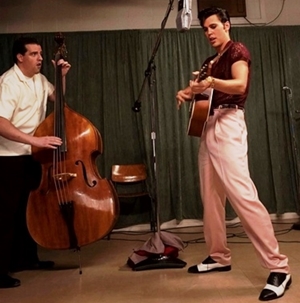 |
(Interview) Alanna Nash talks to EIN: With the recent reissue of her best-selling book, 'The Colonel: The Extraordinary Story of Colonel Tom Parker and Elvis Presley', renowned author, Alanna Nash, took time out of her busy schedule to discuss Elvis, the Colonel and other related issues with EIN’s Nigel Patterson, Elvis Day By Day’s Kees Mouwen, and prolific Elvis author, Paul Bélard.
In her candid interview, Alanna provides insightful commentary about the Colonel’s early years before coming to America, when he lost his way in promoting Elvis, the controversial source Byron Raphael, Lamar Fike’s finding about the rumor the Colonel was involved in the death of a woman in Holland, why Elvis didn’t take more control of his career, the new Baz Luhrmann 'ELVIS' biopic and much, much more...
Read Alanna’s fascinating interview
(Interview, Source:EIN/EDBD/PB) |
|
(Interview) academic and Elvis researcher Mathias Haeussler talks to EIN: In December 2020 Professor Mathias Haeussler’s book, Inventing Elvis: An American Icon in A Cold War World was published.
EIN’s Nigel Patterson sat down with Mathias for a fascinating face-to-face (via the wonders of Zoom technology) and thought-provoking interview.
In the first part of their discussion, some of the topics explored are why Mathias decided to write a book about Elvis’ role in the Cold War context; the official certificate he noticed on display at Graceland; Elvis, youth culture and propaganda in the 1950s; the impact of Elvis’ sexualised performing style; Elvis’ films and the Cold War; and Elvis and the issue of Race.
Read the fascinating interview here..
(Interview, Source:ElvisInformationNetwork)
|
 |
Andy Warhol - The Elvis Works: In this narrative and pictorial article we look at some of the iconic images by pop artist, Andy Warhol. In 1963 Warhol established a studio in an abandoned fire station in New York's East 87th Street. It was there that he began work on a head of film star Elizabeth Taylor and a full-length portrait of Elvis Presley.
Warhol’s 1963 'Elvis 2 Times' represented a watershed moment in twentieth-century Art History. The painting combines an investigation of the uniquely American fascination with celebrity and mass media that emerged in the 1960s.
And read about Bob Dylan, Warhol and Elvis - - Dylan acknowledged, "I once traded an Andy Warhol “Elvis Presley” painting for a sofa, which was a stupid thing to do."
The visuals range from variations of "Elvis in Flaming Star" to "Red Elvis". - Go here to discover more about Elvis and Warhol.
(Spotlight, Source:ElvisInfoNet, June 2008/ 2021) |
 |
EIN Spotlight: Changing Times, Heavy books, and the two-class Elvis world: While a lot of fans believe Col Parker was bad for Elvis the one thing the Colonel usually got right was to look after the fans. From reasonable ticket prices, cheap licensed merchandise and assisting fan clubs, he worked with fans to engender good will and build interest in the latest Elvis releases. In 2020, the situation is very different. EPE is owned by commercial interests meaning entry costs to Graceland, and buying licensed Elvis merchandise is no longer cheap - and importantly, no longer affordable for many who have been fans since the 1950s.
Another change is Follow That Dream, RCA-SONY, Eric Lorentzen, Venus, etc all now publish expensive "Deluxe" collections. Some costing US$350. Out of reach for most fans, so why is this?
The answer, of course, is money. There is obviously a neat profit in targeting the higher end of the Elvis fan market. In this respect, the proliferation of coffee table Elvis books is similar to the (admittedly) less regular annual Elvis box set extravaganzas from RCA/BMG/Sony. And, of course, plenty of the material in all these publications has usually been previously released but now include a few new additions or "upgrades" to attract customers.
Go HERE to read comments in full,- and Have Your Say.
(Spotlight; Source;NP/ElvisInfoNet) |
 |
(Interview) Carlos Ares talks to EIN: With his latest book, elvis@argentina 1963-1969 just published, Argentine Elvis world legend, Carlos Ares, took time out to talk to EIN’s Nigel Patterson about the book and other things Elvis.
In a wide ranging and fascinating interview, Carlos discusses how he first became an Elvis fan, his famed Elvis collection, how he moved from managing rock bands in South America to becoming an Elvis dealer (Elvis Shop Argentina) full-time, Argentinian Elvis records and film posters, how the assassination of JFK affected popular music, the release of 'Elvis La Pelvis' and to make most of us jealous seeing Elvis live on stage, plus a lot more.
Read Nigel Patterson's interview with Carlos R Ares.
(Interview, Source:ElvisInfoNetwork) |
 |
Jean-Marie Pouzenc Interview: Jean-Marie Pouzenc is one of Europe's most well-known identities in the Elvis fan world. He is the founder and long-time president of the celebrated Elvis My Happiness fan club and publishes one of the best Elvis magazines in the world.
Jean-Marie has also written a number of acclaimed Elvis books including his latest coffee table release, Elvis Technicolor in Black & White.
In this fascinating interview Jean-Marie Pouzenc, now 77 years old, discusses...
- How and when he became an Elvis fan
- What changes he has noticed in the Elvis world since 1956
- Elvis' popularity in France
- His new publication 'Elvis Technicolor in Black & White'
- Elvis in Paris
. . . . and much, much more
Go here - EIN's Nigel Patterson ask the questions
(Interviews, Source;ElvisInformationNetwork) |
 |






